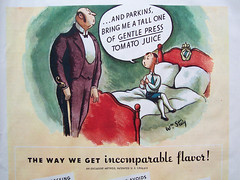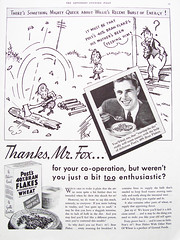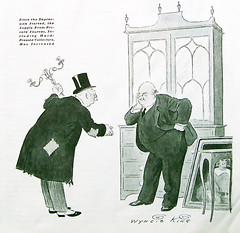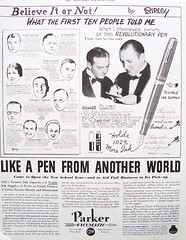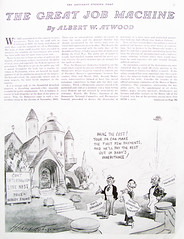Posted by Mike Rhode on Jan. 5, 2011
| Almost to the day 90 years ago, the now under-appreciated Art Young penned this cartoon for his short-lived, self-published magazine Good Morning. Given current events, enjoy it for its timelessness!! |
| Here's a tip from Warren Bernard. This is a National Archives event and hopefully will be free, but it doesn't specify on their calendar yet. Thursday, January 6, at 7 p.m. Presented at the Newseum's Walter and Leonore Annenberg Theater 555 Pennsylvania Ave., N.W. Washington, D.C.
Political Cartoons of the Civil War and Their Role in Shaping History How do political cartoons from the Civil War era reveal what Americans thought about the war and how they participated in the politics of the day? Join us for an illustrated discussion focusing on political cartoons—whether humorous, clever, or scathing—and their role in providing insight into the economic, political and moral issues surrounding the Civil War. Featured will be both Union and Confederate political cartoons. Moderated by Harold Holzer, co-author of The Lincoln Image: Abraham Lincoln and Popular Print, panelists include Joshua Brown, author of Beyond the Lines: Pictorial Reporting, Everyday Life, and the Crisis of Gilded Age America, John Adler, who compiled for the online resource HarpWeek, Illustrated Civil War Newspapers and Magazines, and Richard West, co-author of William Newman: A Victorian Cartoonist in London and New York.
The National Archives Experience is pleased to present tonight's program in partnership with the Newseum. |
This was shortened drastically when it appeared in the Washington City Paper's print version and online as "Hate Comic Books? Library of Congress Opens Papers of Comics Opponent Fredric Wertham," Aug. 11, 2010, http://www.washingtoncitypaper.com/blogs/artsdesk/books/2010/08/11/hate-comic-books-library-of-congress-opens-papers-of-comics-opponent-fredric-wertham/ last year. Completely understandable, as I turned in 3,500 words when they asked for 2,000 and had space for 1,000. Starting a new year, I'll assume ComicsDC readers may be interested in the longer version. My thanks again to everyone who helped me out and cooperated with writing this. Except for the first 3 words, this is as I wrote it last August.
This past summer, the Library of Congress opened a collection of papers from the man who almost singlehandedly destroyed comic books in the 1950s. Or perhaps they instead opened the collection of one of the first psychologists to be concerned with children's mental health and pop culture's possible effects. Opinions vary, and people of good faith disagree, but this past May, the Library of Congress quietly opened 222 containers of psychiatrist Fredric Wertham's papers. While the great majority of Americans haven't heard of the man, for a select few, the ability to read through his letters will be a big deal. That's because Fredric Wertham wrote a book about comic books and juvenile delinquency. Wertham's Seduction of the Innocent came out in 1954 as a culmination of a decade-long campaign against comic books, and quickly became a rallying point for Cold War concerns about teenage culture. Although the Library has had the records since 1987, they've been sealed except to people approved by Wertham's estate—and in that time, only two people were allowed to use them.
"For comic-book fans, Fredric Wertham is the biggest villain of all time, a real-life bad guy worse than the Joker, Lex Luthor, and Magneto combined," comics historian Jeet Heer wrote for Slate's review of David Hajdu's book, The Ten-Cent Plague: The Great Comic-Book Scare and How It Changed America. "For Wertham, even the most beloved comic-book heroes were suspect: Superman reminded him of Nazi Germany's SS (a cadre of self-styled supermen), the adventures of Batman and Robin had homoerotic overtones, and Wonder Woman threatened to turn healthy young girls into lesbians." Many comic book collectors believe that Wertham almost destroyed comics, as after being hauled before a Congressional investigation, publishers created a Comic Code Authority to self-police themselves and began selling the bland superheroes that the 1960s Batman television show would mock. Amy Nyberg, author of Seal Of Approval: The History Of The Comics Code, places a good bit of the blame on Wertham. She wrote, "The key witness at the Senate hearings and the leader of the crusade against comics was Wertham. He took the position that comic books were harmful, and he pressed for legislation restricting the sale of comic books to children under age sixteen." In Nyberg's work, we see the first signs of rehabilitating Wetham's reputation and she continued, "But Wertham's argument was much more complex than the idea he was often accused of perpetrating: that there was a direct causal link between comic book reading and juvenile delinquency. The problem of juvenile delinquency, he believed, stemmed from the fact that society was trapped in a 'cult of violence' of which comic books were simply a manifestation."
Bart Beaty, one of the two people permitted to use the collection before this summer, has probably done the most to renovate the reputation of Wertham with his book, Fredric Wertham and the Critique of Mass Culture. At its core, Beaty's book argues that Wertham was right and comic books should have been regulated; however it is worth noting that Beaty, as a Canadian, has no First Amendment rights or protections in his own country. It is also notable that Wertham's crusade against comic books was replicated in many other countries – John Lent's book Pulp Demons: International Dimensions of the Postwar Anti-Comics Campaign details a similar story in Canada, Germany, Australia, Britain and Asia.
Wertham's research wouldn't be accepted by most today, as it relied on anecdotal evidence from youngsters he saw in his Harlem practice, where he ran the Lafargue Psychiatric Clinic. However, in an online debate with Craig Fischer posted at The Comic Reporter as 'Let's You and Him Fight: Fredric Wertham and the Critique of Mass Culture Day One,' Beaty wrote "A great many of the things that Wertham believed are things that I believe today, and in his writings and papers what I found was not some crazed loon, but a highly intelligent and highly principled man unafraid to take unpopular stands in troubled times. When comic book fans tell me that Wertham should rot in hell for criticizing EC Comics I am mystified. Here's a man who opened a free psychiatric clinic in Harlem at a time when he was one of a small handful of doctors who would even treat black psychiatric patients, working there no less than two nights each week as a volunteer, and providing testimony that was important to overturning American school segregation, and we're worried about the fact that he didn't like EC? Talk about missing the forest for the trees."
Among the 88,000 items in Wertham's papers are "notes, drafts, and related materials for Wertham's major works including Seduction of the Innocent (1954)." In Seduction, Wertham showed multiple examples of disturbing scenes reprinted from comics, including torture and murder. According to Sara Duke, the librarian who mentioned the opening of the collection on the Comix-Scholar's e-mail list, rather than sending the comics to be housed with the rest of the library's collection, "The Manuscript Division is keeping the comic books [Wertham used] because he made notations on onion skin paper and inserted them in his comic books." Wertham's papers add another important component to the library's comic-art collection, which includes comic books in the Serials Department and original comic art in the Prints and Photographs Division (including the original artwork to the first Spider-Man appearance).
Beaty's devoted a significant portion of his life to studying comic books – an avocation that he feels that Wertham probably wouldn't appreciate. In the third day of his debate with Fischer, Beaty noted, "…[I]n Seduction Wertham sees absolutely no value in comic books. It's hard to find a single approving thing he has to say about comics in the entire manuscript (whatever exceptions exist are sarcastic). On the other hand, he does seem to find some value in them in The World of Fanzines, his last book. I sometimes wonder if this is a drastic late career shift in belief (as many argue) or a natural continuation and logical extension of his existing thinking. It seems to me that Wertham did recognize some value in comics - particularly comic strips. He was friendly with people like Milton Caniff (and owned a Caniff original) and Al Capp, for example. I think that The World of Fanzines sheds some light on the reasons: Wertham didn't hate the form so much as the industry (though, clearly, he was no fan of the form). Some of the excised material from Seduction would have made this even more clear. Wertham spoke with a number of cartoonists who told him that it was the publishers who required more blood, guts and gore in the book, and many of these whistleblowers saw Wertham as someone who could help end a practice that they themselves were uneasy with. The draft that Wertham sent to the publisher, for example, contained revelations about DC's treatment of Siegel and Shuster that came right from the source, and would have blown the lid off the shoddy treatment that they received decades before it became a cause celebre in fandom. The lawyers, however, thought it would be actionable and that entire chapter becomes a series of unnamed sources, which considerably dampens its impact (it's so gutted and toothless that I sometimes wonder why he even bothered to retain it)."
Charles Hatfield, author of Alternative Comics: An Emerging Literature says he had "never heard or read a defense of his work until 1995, when I attended a conference panel in comics studies that happened to include Wertham scholar James Reibman. To say that I was surprised to hear Reibman defend Wertham, and endorse some of the findings of Seduction, would be a pitiful understatement. I was shocked, frankly, and I remember discussing that panel with my wife and others afterward and trying to grapple with the possibility that there could be a reading of Wertham other than the comic fan's usual demonization. I would soon learn that Wertham was a progressive intellectual, that his expert testimony played a part in dismantling legal segregation in this country, and that he provided low-cost or free mental health care to the disenfranchised and neglected. While I don't endorse Reibman's interpretation, it's hard not to admire, and to be fascinated by, a figure such as Wertham, one who defied many of the prejudices of his time and took such forward-looking and liberating positions."
"I still believe that Wertham was wrong about comics: not necessarily about the content of the most retrograde and vicious of the comics of that era (there was indeed some hateful material in those comics), but about the supposed impact of the form on literacy and reading habits, which he saw as uniformly detrimental. The larger literacy argument that Wertham tried to make was and still is generally neglected, as opposed to the moral hygiene and social justice arguments, and I think on the literacy question he was dead wrong. After more than fifty years we are still obliged to reference Seduction in much of our comics scholarship, and so the opening of Wertham's papers to more researchers should be celebrated. This is a very important resource!"
Joseph Witek is the author of the groundbreaking study Comic Books as History: The Narrative Art of Jack Jackson, Art Spiegelman, and Harvey Pekar. He's undertaken a project where he is now reading a lot of pre-Comics Code books and notes, "One thing that gets lost in the demonization of Wertham is something that has become clear now that digital scans of pre-Code comics are becoming widely available: his characterization of those comics is often absolutely accurate. To a large extent, later comics readers have been misled by the narrow selection of reprinted crime and horror comics that were previously available--EC comics were not "average" in taste or quality by a very long shot. You don't have to agree with Wertham's ideas about the social or moral consequences of reading such comics to see that many of them contain depictions of violence, sex, and to some extent, racism that go far beyond anything shown in most other media of the day. Many comics were available to anyone big enough to put a dime on the counter that certainly would have "Mature readers" or other content warnings today. "
"The question of whether Wertham was "right" depends on what he is supposed to have been right about--he made a lot of sweeping statements about a number of complex issues, and it's obvious that the main question of media effects has yet to be resolved, if indeed it ever could be. Comics of the day often: Were more graphically violent than almost any other popular media; were extremely racist and sexist; were poorly drawn, written, and edited; were shoddily printed; contained manipulative and arguably fraudulent advertisements; were available to readers of all ages; and contained story content and ads aimed at readers of wildly different ages. How such content actually affected the behavior of different readers and what, if anything, should be done about such comics are different matters."
Joel Pollack, owner of the local Big Planet Comics store, came to comic books as Wertham's crusade was fading a bit. "I discovered comic fandom (and Wertham) at the age of 14. I assumed the popular belief that Wertham had tainted comics, and peoples' opinions of comics, in an irreparable manner. I regularly borrowed Seduction of the Innocent from the Silver Spring Public Library, but never read it fully cover-to-cover. Nonetheless, I felt Wertham was wrong, and that he never recognized comics as an art form. Of course, by the time I discovered Wertham, TV was established as the dominant corrupter of youth, and comics were already becoming a very minor player in youth media. However, I believe the CCA did stifle creativity. Seeing what EC Comics accomplished, even with all of their excesses, made me realize how soporific comics became once the code was installed. As a retailer, I like to know what to expect in the comics I sell, but I'm not sure a ratings system is necessary, as they tend to be inconsistent and often unpredictable."
The Library didn't actually collect Wertham's papers for his comic book work. Len Bruno, Manuscript Historian, is a specialist in science and technology collections at the Library. He's one of ten specialists in different fields that break up the responsibility for collections between them. When one specialist retired, Bruno noted, "I got all the Shrinks. Sigmund Freud's papers are a magnet that bring in other collections. Having the Freud papers here is the lodestone, the foundation for other collections to come in and build upon. The Library documents any and all aspects of American life." The opening of the collection after 23 years doesn't surprise him. "It's not an unusual situation. A lot of collections come with "ten years after my death" provisos. It's business as usual for us. " Personally I feel that Beaty's sympathetic reading of Wertham's lifework, in contrast to much else written about him, was the key to the estate's changing its terms of access.
Bruno described the process that a typical collection goes through before the public can access it easily. "It was processed and put in some kind of order. We're really blessed that we have a bunch of archivists that are schooled on how to do this and follow classical and traditional ways and respect original order. They look at every piece of paper and spread everything out and once they understand the person and his or her career and why it's here, they put like with like. To them it's business as usual. It's amazing what they do. It takes a certain type of person who can see both the forest and the trees. You see just one and you're unable to do the job. The average person would look at it and just throw up their hands. They have to respect the details, but not get overwhelmed by them. And once they do it all, the finding aid really is literally that - it tells you need to go to a box to find a particular thing without wasting your time. They prepare the finding aid, right a biography of the person, and a little scope note. They produce a complete package when they're done - really essential when you want to use a big collection like that. To use it, you register with the Library, and get a reader card, and then show up, and be over 18 and behave yourself. You can have four boxes at a time, and check with us before photocopying. It's stored offsite and we've been calling in boxes so there's next-day service."
Bruno says, "Yes, there have been a number users already. I thought there would a waiting line, and fortunately there weren't. It's been steadily, but not heavily used. I'm not in the reading room so I don't always know when something's been used. Casual readers are welcomed at the Library – "European researchers always mention that they didn't have to demonstrate credentials or have an interview, and they're very happy at the way we run things. We're geared to do one thing, and that's to serve readers." One restriction does exist though – "We're required to segregate patient records. There were the equivalent of four boxes of obvious patient records so they were physically removed and put in a closed box at the end of the collection. We had the feeling that Wertham, the way he did things, may have patient information that didn't jump out at you so there's a requirement that researchers agree that they not disclose patient information or names they come across."
When asked if he had any plans for the collection, Bruno replied "No, given that it just opened, it's only come to the forefront for us and we've only started recently thinking about it. It's just business as usual." Bruno's not a comic book reader now, but "When I was a kid I was; I grew up in the 50s, I had Daffy Duck and Scrooge McDuck... I grew up in a blue-collar household and money was a little spare, so comic books were exceedingly a luxury. When I was very sick at home for more than a few days, my dad would drop off one or two, and for me that was very thrilling." Bruno also noted the Manuscript Division had a couple of other collections of interest – "Jules Feiffer's papers, he's a top of the line cartoonist whose a curious, biting intellect, interested in lot of things. Herblock too - 205 boxes of his papers for a total of 75,000 items."
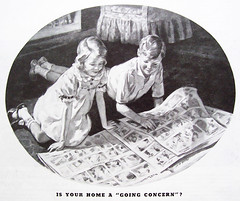
I had three decomposing issues of the Saturday Evening Post from 1934, so I've photographed the cartoon advertisements or illustrations in them and put them on my Flickr site (click through the link because they're not all posted here).
